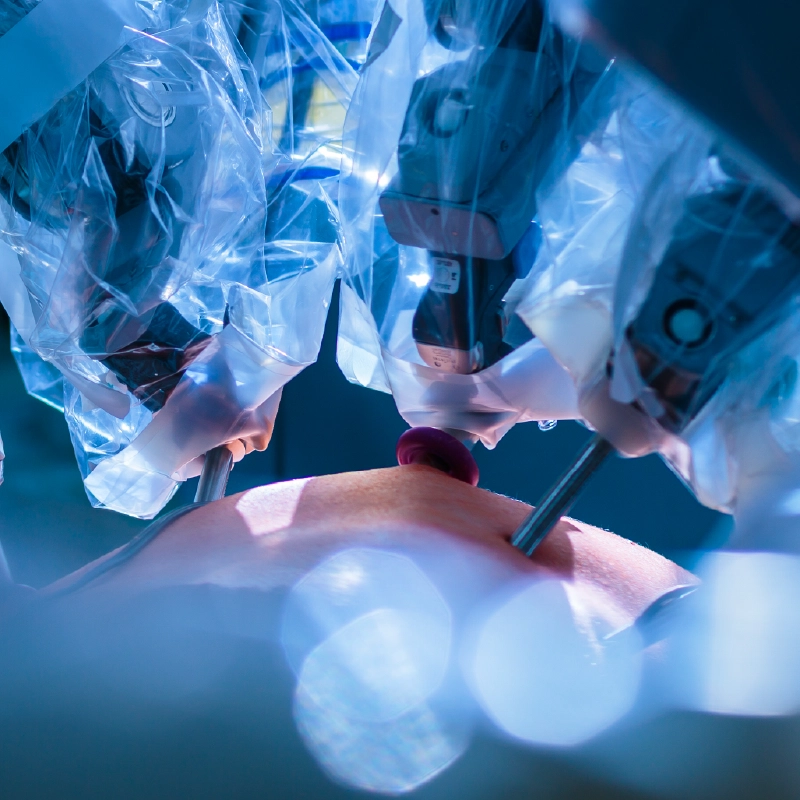
GI cancer stands for gastrointestinal cancer, which refers to a group of cancers that affect the digestive system. This includes cancers of the oesophagus, stomach, small intestine, colon, rectum, liver, gallbladder, and pancreas.
The most common types of GI cancers are colorectal cancer, stomach cancer, and liver cancer. The symptoms and treatment options for GI cancer depend on the type of cancer and its stage. It is important to seek medical attention if you experience any persistent symptoms such as abdominal pain, changes in bowel habits, unexplained weight loss, or blood in the stool.
Gastrointestinal cancers are often difficult to treat and require complex surgical procedures to remove them. However, advancements in technology have led to the development of robotic surgery, which has revolutionized the field of GI cancer surgery. You can consult with a gastro surgeon to know the available treatment options for your condition including, Robotic Surgery in Bangalore.
What is Robotic Surgery?
Robotic surgery is a type of surgery that involves the use of robotic arms to carry out minimally invasive (keyhole) surgical procedures. The robotic arms are controlled by a surgeon who sits at a console and operates the instruments using a high-resolution 3D camera. The robotic arms are equipped with small surgical instruments that can rotate 360 degrees, providing a high level of precision and control during surgery.
Robotic surgery for GI cancer is particularly useful for complicated surgeries that require a high level of precision, such as those involving the liver, pancreas, and rectum. These surgeries are often difficult to perform using traditional laparoscopic surgery techniques due to the complexity of the anatomy and the risk of complications. Thus, robot enables completion of such difficult surgeries through minimally-invasive (keyhole) techniques. With Sakra, you receive “Comprehensive Robotic Care” that ensures speedy recovery with minimal pain and scarring.
We perform Robotic GI Surgery for the following conditions:
Esophagogastric
- Esophagectomy for oesophagal cancer
- Hiatal hernia repair and fundoplication
- Cardiomyotomy (Heller’s procedure for Achalasia cardia)
- Sleeve gastrectomy, mini gastric bypass
- Distal gastrectomy, subtotal gastrectomy, and total gastrectomy for cancers and benign diseases
HPB
- Liver resection: both minor and major
- Pancreatectomy - Removal of a portion of the pancreas for tumours
- Splenectomy
- Radical cholecystectomy for gallbladder cancer
- Other complex HPB surgical procedures like biliary strictures
Colorectal
- Procedures for colorectal cancers - Right hemicolectomy; Left hemicolectomy; Low anterior resection; Abdominoperineal resection
- Procedures for rectal prolapse – Rectopexy
- Procedures for ulcerative colitis – total proctocolectomy with pouch anastomosis
Hernia
- Complex Abdominal wall hernias- incisional, ventral, recurrent hernias
- Complicated Inguinal, and femoral hernias
What are the benefits of Robotic GI Surgery?
One of the major benefits of robotic surgery is that it is minimally invasive, which means that it requires smaller incisions and causes less trauma to the body. This results in less pain, faster recovery times, and a lower risk of complications. Additionally, the high level of precision provided by the robotic arms allows surgeons to perform more complex surgeries with greater accuracy, leading to better outcomes for patients. In summary, the benefits include:
- Smaller incisions
- High Precision
- Less pain and scarring
- Faster recovery time
- Good accuracy
Robotic surgery for GI cancer has also been shown to be effective in reducing the length of hospital stays and the need for postoperative pain medication. This is because the minimally invasive nature of the surgery allows patients to recover faster and experience less pain and discomfort.
Who is the right candidate for Robotic GI Surgery?
The decision to undergo robotic GI surgery is made on a case-by-case basis by a patient's medical team, taking into account the individual patient's medical history, condition, and surgical needs. However, there are some general factors that can help determine whether a patient may be a good candidate for robotic GI surgery.
- Patients who are generally healthy and have a lower risk of complications from surgery are often good candidates for robotic GI surgery. Patients who are younger and have a body mass index (BMI) within a healthy range may also be good candidates.
- Patients who have previously undergone abdominal surgery may also be good candidates for robotic GI surgery, as the minimally invasive nature of the procedure can help reduce the risk of complications related to scar tissue and other complications from prior surgery.
- Patients with certain medical conditions, such as severe heart or lung disease, may be at higher risk for complications during surgery and may not be good candidates for the procedure.
- Patients who are very overweight or obese may also be less suitable candidates, as the robotic instruments may not be able to reach the surgical site as easily.
In conclusion, robotic surgery has revolutionized the field of GI cancer surgery, providing a high level of precision and control during complicated surgeries. This minimally invasive technique offers a number of benefits for patients, including less pain, faster recovery times, and a lower risk of complications. Robotic surgery is a valuable option for surgeons treating complicated GI cancers. Sakra World Hospitals is among the best robotic surgery hospitals in Bangalore that provide comprehensive robotic care for a number of medical conditions.

